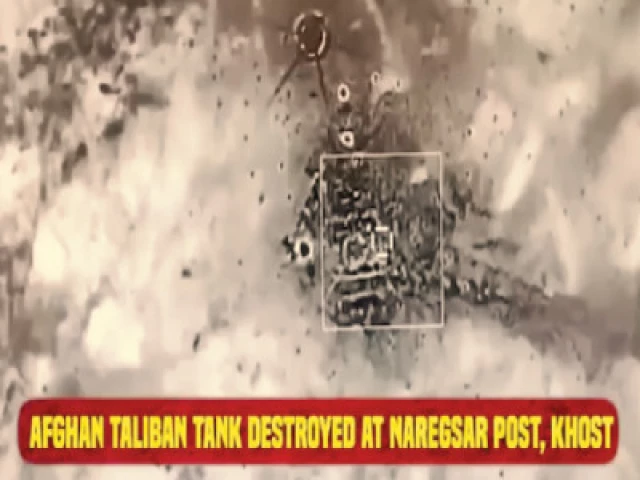Afghan Taliban, TTP open fire in Kurram sector, Pakistan destroys posts and tanks in retaliation
ISLAMABAD:
After a lull of a few days, tensions along the western border resumed on Tuesday evening when the Afghan Taliban and terrorists of the Tehreek-e-Taliban Pakistan (TTP), a banned group, opened fire without provocation in the Kurram sector.
According to security sources, the Pakistani army provided “a strong and effective response”, inflicting heavy losses on Taliban positions. As a result of the army’s retaliation, fires broke out in several Taliban posts and several enemy tanks were destroyed.
A video clip showing a moving tank being accurately hit was also shared on social media. The Taliban and TTP members then abandoned their posts and fled, leaving behind several bodies.
In the Khost region of Afghanistan which shares the border with Kurram, the tank positioned at the Nargsar post was destroyed along with its crew. Several Taliban and TTP members were killed inside the tank.
The Pakistani army also targeted the Taliban tank position known as Shamshad Post. Later, Taliban soldiers and TTP terrorists raised a white flag at a nearby border post.
The army also destroyed a tank and its crew at Turkmanzai Top. According to sources, flames could be seen rising from the destroyed tank through night vision devices (NVD).
The Pakistan Army also targeted the training camp of TTP commander Naeem, located opposite Polsin post, and completely destroyed it.
Security officials said there were reports of the killing of a key TTP commander, Fitna al-Khawarij, during the fighting, which continued until filing this report.
On Saturday evening, Afghan forces opened fire without provocation at several locations along the border, including in Angoor Adda, Bajaur, Kurram, Dir and Chitral areas of Khyber-Pakhtunkhwa (KP) and Zhob district of Balochistan province.
The Pakistani army responded quickly and forcefully and its retaliation resulted in the deaths of 200 Taliban and TTP members. Twenty-three soldiers of the Pakistan Army embraced martyrdom during the clashes.
The aggression from the Afghan side came at a time when Afghan Foreign Minister Amir Khan Muttaqi was on an official visit to India. Following the confrontation, several countries, including Saudi Arabia and Iran, urged both countries to exercise restraint.
The Afghan Taliban government on Friday accused Pakistan of carrying out airstrikes on its territory and warned of “consequences”. Islamabad said its patience with Kabul was running out, without acknowledging or denying carrying out airstrikes.
At a press conference on Friday, Director General of Inter-Services Public Relations (ISPR), Lt Gen Ahmed Sharif Chaudhry, “took note” of the reports of the strikes. “To protect the lives of the people of Pakistan, we are doing and will continue to do whatever is necessary. Our demand to Afghanistan: your soil must not be used for terrorism against Pakistan,” he added.
Islamabad accuses Afghanistan of failing to expel terrorists using Afghan territory to launch attacks against Pakistan, a charge that authorities in Kabul deny. The TTP and its affiliates are behind most of the violence in Pakistan, much of it directed at security forces.
According to some experts, Pakistan has finally decided to change its policy towards the Afghan Taliban, of which it established itself as the greatest support when they returned to power in August 2021.
The Foreign Office on Monday left a clear hint at Pakistan’s change of heart towards the Afghan Taliban, by refraining from describing the Kabul administration as the Afghan interim government, but instead calling it the “Taliban regime” – a move calculated to call into question its legitimacy.
“Pakistan wants a peaceful, stable, friendly, inclusive, regionally connected and prosperous Afghanistan. Pakistan expects the Taliban regime to act responsibly, honor its commitments and play a constructive role in achieving the common goal of eradicating terrorism from its soil.
“We also hope that one day the Afghan people will be emancipated and governed by a truly representative government,” the Foreign Ministry said.




